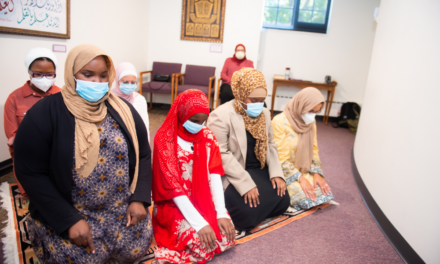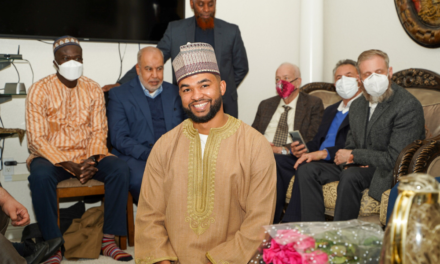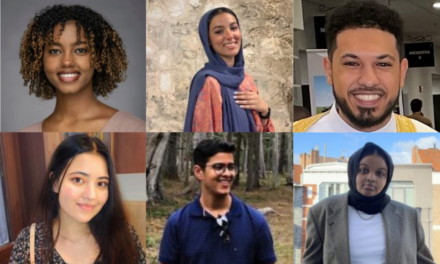Maintaining a diverse workplace is a goal of many businesses and non-profits. The Black Lives Matter movement has only heightened concerns about diversity and inclusivity in both the corporate and not-for-profit sectors.
In Madison, a new change management consulting firm called Empathy 4 Equity aims to help businesses address those concerns.
Nasra Wehelie, the CEO and founder of Empathy 4 Equity, said that while businesses and organizations work hard at recruiting people of color, they often have trouble retaining those employees. “It’s a generous effort, but there’s no second layer,” Wehelie said. “You bring a person of color into the workplace, and that person is so miserable.” People from diverse ethnic and cultural backgrounds leave the workplace because they feel disrespected, excluded, and misunderstood.
“I founded this organization to build a culture of empathy for organizational excellence,” said Wehelie, who will begin working with her first client this August, after a 2-year stint as development director with a high-profile Madison non-profit.
“When you talk about building a culture of empathy, it’s the ability to sense others and understand their emotions, right? Organizations sometimes need help understanding who their employees are, who their customers are, how to engage their boards,” Wehelie said. “People talk about equity, but without empathy, you cannot have equity.” Real equity, she said, is “heart, mind, hands, all working together for transformational social change.”
Wehelie believes that empathy is the key to retention of employees of color because “anti-bias training has failed in the workplace. You just provide opportunity for one person of color but there is no follow-up. So my focus will be equity by results in the workplace.”
The Somali native has been a non-profit leader in Madison for the past fifteen years. A graduate of UW-Madison, she has an MBA from Cardinal Stritch University. She was the Brava Magazine Woman to Watch in 2015 and the recipient of the MUM Partners for Change Visionary Award in 2018. She has served on the boards of the Boys and Girls Club of Dane County, Rotary Club of Madison, and UW-Madison’s Morgridge Center for Public Service.
Wehelie ran her own consulting business, Dedicated Consultants, which worked on diversity, inclusion, and equity, before joining Madison-area Urban Ministry (MUM) in 2015 as director of development. Prior to joining the staff, Wehelie held a board position at MUM.
MUM has recently rebranded itself as JustDane. It continues to provide job training and other services to those who have been incarcerated. Linda Ketcham, the executive director of JustDane, credits Wehelie with being key to the organization’s growth. “Nasra will tell you exactly what she’s thinking, what she’s feeling, and open the doors for conversation around that.” As MUM’s first development director, Wehelie “was a wonderful fit. She had the ability to draw people into the work we were doing.”
The development position started out part-time time, Ketcham said, “but within four months Nasra had generated enough revenue to make that a fulltime position and had connected us to the business community.” Ketcham started MUM “a little over 14 years ago. We had 8 people on staff. When Nasra joined, we were up to 18 employees, but we had not increased our internal capacity administratively. She really shored up connections we already had.”
The culmination of that shoring up, Ketcham said, was “a significant gift that really boosted our visibility,” a $500,000, 3-year pledge from CUNA Mutual Foundation made in 2017. CUNA had supported MUM’s work previously at the $5,000 level. In addition, said Ketcham, the pledge was “unrestricted so we could use the funds to support new projects as well as existing initiatives.”
Ketcham said that in working with Wehelie, “I learned a lot . . . about fundraising. It was a mutual mentoring experience and working experience.”
Working at MUM, said Wehelie, was “very transformational.” As a leader, Ketcham “let me fly and trusted me with the organization.” Ketcham had established “a very inclusive work environment, where I felt valued and respected and had the autonomy to do what I had to do.”
Wehelie worked at MUM for three years. “She did an amazing job in that period of time,” Ketcham said. “We were fortunate to have her be part of our agency, both as a board member and as staff.”
In 2018, Wehelie left to become the director of development and communications of a larger, well-established non-profit, where she managed a staff of seven doing major gifts, marketing, events, and database development.
Working in that organization taught Wehelie about toxic work environments, which she said are often due to “poor leadership . . . when you are not respected or valued and you begin to question your own worth.”
She left that position after two years. “So now I am founder and CEO of Empathy 4 Equity,” Wehelie said. “I decided to go out on my own and help people like me and help organizations that have no clue what they’re doing, whose clients are people of color.” Her goal is to “help organizations build an inclusive and just and belonging environment.”
The solution to retaining people of color in the workplace, she said, is for “organizations to create policies, practices, and a work culture that intentionally promotes diversity, inclusion, equity, and empathy.”
Wehelie believes that diversity and inclusion efforts fail because organizations don’t “provide the tools” that people from diverse communities need to thrive in the workplace, and because they fail to eliminate unconscious bias. To address those issues, Wehelie has a process in place. The “4” in Empathy 4 Equity refers to a program Wehelie has developed that she calls “the 4 Ps.”
The first P refers to Purpose or intention, helping clients identify why they want to build a culture of empathy, being intentional about it, and defining long-term goals. This step, she says, involves “sitting down with me, talking one on one, and assessing the vision.”
The second P refers to Policy, “creating a respectful environment for people regardless of their background by advocating an inclusive approach.” The key there is “understanding how systemic discrimination threatens fairness and employee morale.”
The third P is Practice, “cultivating empathy within the organization and expanding our empathy when we talk to people outside our circle. “Within the community, we see a lot of silos. People tend to be comfortable with others like them.” Practice means “challenging prejudice and discovering commonalities. That’s where my training on unconscious bias will come in.”
The fourth P is Progress, measuring the ways that “the empathetic workplace has less stress and higher employee morale” as well as “building social connection with community, customers, and employees,” said Wehelie. “We shouldn’t be shying away because it’s an uncomfortable conversation,” she said. “You miss an opportunity to connect with your employees, your communities, and your customers.”
Wehelie emphasizes that, “There’s no one program, one benefit or one action that will build workplace empathy, it has to be a continuous effort that is modeled by the leadership.”














